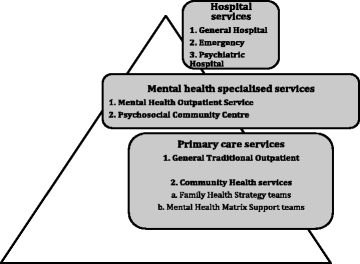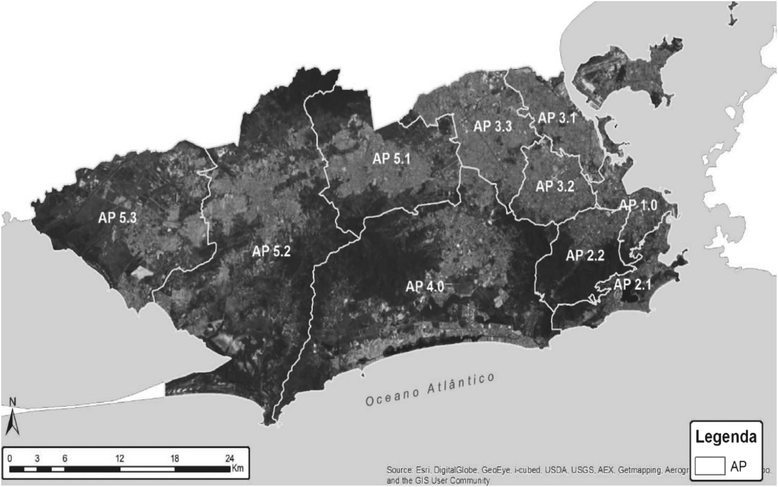Perceptions of health managers and professionals about mental health and primary care integration in Rio de Janeiro: a mixed methods study
- PMID: 27716299
- PMCID: PMC5045579
- DOI: 10.1186/s12913-016-1740-8
Perceptions of health managers and professionals about mental health and primary care integration in Rio de Janeiro: a mixed methods study
Abstract
Background: Community-based primary mental health care is recommended in low and middle-income countries. The Brazilian Health System has been restructuring primary care by expanding its Family Health Strategy. Due to mental health problems, psychosocial vulnerability and accessibility, Matrix Support teams are being set up to broaden the professional scope of primary care. This paper aims to analyse the perceptions of health professionals and managers about the integration of primary care and mental health.
Method: In this mixed-method study 18 health managers and 24 professionals were interviewed from different primary and mental health care services in Rio de Janeiro. A semi-structured survey was conducted with 185 closed questions ranging from 1 to 5 and one open-ended question, to evaluate: access, gateway, trust, family focus, primary mental health interventions, mental health records, mental health problems, team collaboration, integration with community resources and primary mental health education. Two comparisons were made: health managers and professionals' (Mann-Whitney non-parametric test) and health managers' perceptions (Kruskall-Wallis non parametric-test) in 4 service designs (General Traditional Outpatients, Mental Health Specialised Outpatients, Psychosocial Community Centre and Family Health Strategy)(SPSS version 17.0). Qualitative data were subjected to Framework Analysis.
Results: Firstly, health managers and professionals' perceptions converged in all components, except the health record system. Secondly, managers' perceptions in traditional services contrasted with managers' perceptions in community-based services in components such as mental health interventions and team collaboration, and converged in gateway, trust, record system and primary mental health education. Qualitative data revealed an acceptance of mental health and primary care integration, but a lack of communication between institutions. The Mixed Method demonstrated that interviewees consider mental health and primary care integration as a requirement of the system, while their perceptions and the model of work produced by the institutional culture are inextricably linked.
Conclusion: There is a gap between health managers' and professionals' understanding of community-based primary mental health care. The integration of different processes of work entails both rethinking workforce actions and institutional support to help make changes.
Keywords: Collaborative care; Implementation science; Integration; LAMIC; MHGAP; Mental health; Mental health matrix support; Mixed methods; Primary care; Public health.
Figures
Similar articles
-
Integrating Behavioral Health and Primary Care: Consulting, Coordinating and Collaborating Among Professionals.J Am Board Fam Med. 2015 Sep-Oct;28 Suppl 1(Suppl 1):S21-31. doi: 10.3122/jabfm.2015.S1.150042. J Am Board Fam Med. 2015. PMID: 26359469 Free PMC article.
-
Closing service system gaps for homeless clients with a dual diagnosis: integrated teams and interagency cooperation.J Ment Health Policy Econ. 2003 Jun;6(2):77-87. J Ment Health Policy Econ. 2003. PMID: 14578540
-
Joint working in community mental health teams: implementation of an integrated care pathway.Health Soc Care Community. 2004 Nov;12(6):527-36. doi: 10.1111/j.1365-2524.2004.00523.x. Health Soc Care Community. 2004. PMID: 15717899
-
What are the views of hospital-based generalist palliative care professionals on what facilitates or hinders collaboration with in-patient specialist palliative care teams? A systematically constructed narrative synthesis.Palliat Med. 2016 Mar;30(3):240-56. doi: 10.1177/0269216315615483. Epub 2015 Nov 4. Palliat Med. 2016. PMID: 26873984 Review.
-
Perspectives of community mental health nurses as care coordinators within a multidisciplinary team: A systematic review.J Interprof Care. 2025 May-Jun;39(3):499-509. doi: 10.1080/13561820.2025.2487032. Epub 2025 May 2. J Interprof Care. 2025. PMID: 40314258 Review.
Cited by
-
[Mental Health Global Action Programme (mhGAP) in Chile: Lessons Learned and Challenges for Latin America and the CaribbeanPrograma de ação mundial para reduzir as lacunas em saúde mental (mhGAP) no Chile: aprendizados e desafios para América Latina e Caribe].Rev Panam Salud Publica. 2021 Apr 6;45:e32. doi: 10.26633/RPSP.2021.32. eCollection 2021. Rev Panam Salud Publica. 2021. PMID: 33833786 Free PMC article. Spanish.
-
Positive mental health for all serving the under-served.Ind Psychiatry J. 2023 Jul-Dec;32(2):234-239. doi: 10.4103/ipj.ipj_132_22. Epub 2023 Feb 17. Ind Psychiatry J. 2023. PMID: 38161446 Free PMC article. Review.
-
Leveraging Stakeholder Engagement and Virtual Environments to Develop a Strategy for Implementation of Adolescent Depression Services Integrated Within Primary Care Clinics of Mozambique.Front Public Health. 2022 May 26;10:876062. doi: 10.3389/fpubh.2022.876062. eCollection 2022. Front Public Health. 2022. PMID: 35692315 Free PMC article.
-
Health system constraints in integrating mental health services into primary healthcare in rural Uganda: perspectives of primary care providers.Int J Ment Health Syst. 2019 Mar 22;13:16. doi: 10.1186/s13033-019-0272-0. eCollection 2019. Int J Ment Health Syst. 2019. PMID: 30949234 Free PMC article.
-
Healthcare workers' perceptions and experiences of primary healthcare integration: a scoping review of qualitative evidence.Cochrane Database Syst Rev. 2023 Jul 19;7(7):CD013603. doi: 10.1002/14651858.CD013603.pub3. Cochrane Database Syst Rev. 2023. PMID: 37466272 Free PMC article.
References
-
- World Health Organization. mhGAP intervention guide - For mental, neurological and substance abuse disorders in non-specialized health settings [Internet]. Mental Health Gap Action Programme. Geneva; 2010. - PubMed
MeSH terms
LinkOut - more resources
Full Text Sources
Other Literature Sources
Miscellaneous



